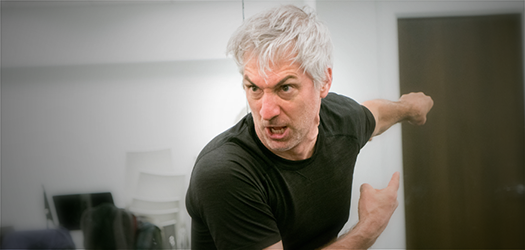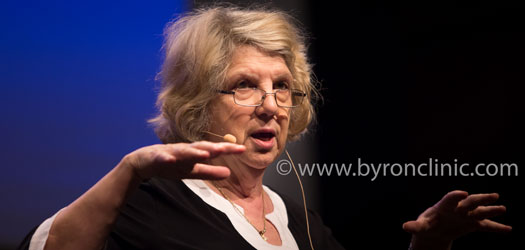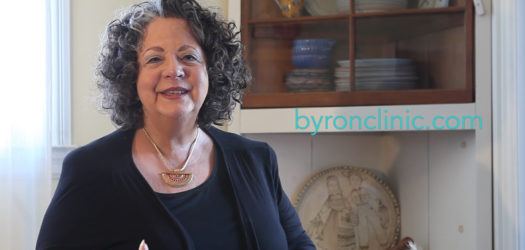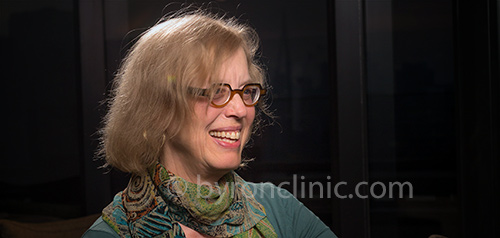Latest News from Byron Clinic
Bessel van der Kolk: A Personal Invitation
Trauma is an inability to inhabit one’s body without being possessed by its defenses and the emotional numbing that shuts down all experience, including pleasure and satisfaction.
Carl Rogers and the Person-Centred Approach
In this broadcast from BBC Radio 4, Claudia Hammond examines the work of Carl Rogers’ revolutionary approach to psychotherapy.
Eating Disorders and Motivational Interviewing
Eating disorder clients show higher treatment completion rate with Motivational Interviewing (more than double). Motivational Interviewing (MI) can be a useful intervention to engage individuals with severe eating disorders prior to participation in intensive treatment.
Depression in Patients with Coronary Heart Disease
The prevalence of depression is high in patients with coronary heart disease and it has a significant impact on the patient’s quality of life, adherence to therapy, and an independent effect on prognosis. The National Heart Foundation of Australia offer a practical easy to use 9 item tool for screening.
The Link between Sleep and Alzheimer’s: it’s a Vicious Cycle
A build-up of beta-amyloid on the brain, thought to be essential in the development of Alzheimer’s disease, can prevent deep sleep. This in turn leads to an impaired ability to expel this toxic protein.
Weight gain… important treatment implications
After a night of bad sleep, the hormone that controls appetite is adversely affected, and emotional stress is heightened.
Hallucinogens Treating Alcohol Dependence: A Proof-of-Concept Study
There has also been a renewed interest from researchers into the so-called ‘classic hallucinogens’ – LSD, mescalin, DMT and especially psilocybin – for use in a range of treatment applications of late.
Methamphetamine Dependence Treated with ADHD Medication
A 2015 study published in the DARU Journal of Pharmaceutical Sciences from the Faculty of Sciences presented a random, double blind, placebo-controlled analysis of the treatment process involving participants with a methamphetamine dependency and sustained-release methylphenidate (MPH-SR).
Motivational Interviewing: hypertensive patients’ self-care agency
Motivational Interviewing & hypertensive patients’ lifestyle changes.
Motivational Interviewing: helping smokers quit
Motivational Interviewing and smoking behaviour.
Are you Stressed and Hooked on Sugar?
The connection between increased sugar consumption and stress.
Motivational Interviewing: Cardiac Rehabilitation Unit & Heart Failure
A 2015 study on Motivational Interviewing and healthier habits.
Motivational Interviewing: Dieticians & Obesity in Primary Care
A 2015 study on Motivational Interviewing and parents of overweight children.
Risk of Exclusion Drives Unethical Behavior
A 2015 study finds that people faced with group exclusion are particularly motivated to engage in unethical behavior in order to improve their chance of being included.
Self-Harming Adolescents – Brief DBT shown to be effective treatment
A randomized controlled study published in the journal Archives of Suicide Research in October 2014, has found evidence suggesting that a modified 16-week DBT course to be effective in the treatment of self-harming teens with BPD symptoms.
Alcohol Detox & Withdrawal – New Findings
In a 2014 study British researchers/clinicians Murdoch and Marsden highlight how an evidence-based, individualised approach to alcohol withdrawal management achieved marked improvements in care.
Stress Hazards during Pregnancy
A January 2015 study shows that increased stress during pregnancy has negative effects on the development of the foetus. Researchers say this may have implications for stressed mothers and the long-term health of their infants.
Childhood Neglect a risk for long-term chronic diseases
A January 2015 study finds that experiences of childhood neglect may be more detrimental to long-term health than other forms of maltreatment.
Erectile Dysfunction
Researchers find mounting evidence from observational studies of a positive dose-response association between quantity and duration of smoking and risk of erectile dysfunction.
Why You Should Write a Letter to Yourself Tonight
An article by Bessel van der Kolk. Here he shows how writing about upsetting events improves physical and mental health.
Successful weight control
A recent study shows a positive relationship between frequent self-weighing and successful weight control
Increasing Longevity
European researchers report that a brisk 20 minute walk each day should be enough to reduce an individual’s risk of early death.
Easy 4 Minute Meditation
This 4 minute meditation is very easy just ‘Focus on the Crystal’ and ignore all distractions to achieve a calm and relaxed state in minutes.
Drug & Alcohol Detox
Byron Clinic provides a medically supervised withdrawal program for clients that seek utmost discretion, privacy and confidentiality.
Bessel van der Kolk: Restoring Joy and Treating Traumatic Stress
Trauma victims cannot recover until they become familiar with and befriend the sensations in their bodies. Being frightened means that you live in a body that is always on guard. Angry people live in angry bodies.
Why do so many people find psychological change so difficult?
Change, in the brain, is not a rare event, it is the day to day modus operandi. But if that’s the case, why do so many people find psychological change so difficult? If change is so possible, why do some people seem to get more rigid as time passes?
Anorexia and the “Plastic Paradox”
Anorexia Nervosa and other eating disorders have the highest mortality rate in all of mental health. Norman Doidge explores a new approach that takes the best of depth psychology psychotherapies and the newest developments in neuroplasticity and brain training.
Norman Doidge: Why Two Brains?
Why do we have two different brain hemispheres? And what difference does understanding this make in our lives and in how we treat patients?
Using Shakespeare to Ease the Trauma of War
Bessel van der Kolk will introduce a short piece of LIVE theatre at his coming workshops and then open the room up for comment and discussion.
Janina Fisher: Alienating Oneself
Janina Fisher explains “splitting” through developments in neuroscience and our ability as humans to dissociate from our emotions to build a more socially acceptable image.
Marsha Linehan: Interpersonal Effectiveness
Interpersonal Effectiveness is one of Marsha Linehan’s DBT skills which enables individuals to balance priorities, reduce anxiety and live a life worth living.
Janina Fisher on Memory of Trauma
Janina Fisher explores the importance of investigating “memory triggering” for a successful treatment outcome when working with trauma clients.
Bessel van der Kolk: Trauma, the Brain & the Body
Trauma victims cannot recover until they become familiar with and befriend the sensations in their bodies. Being frightened means that you live in a body that is always on guard. Angry people live in angry bodies.
Pat Ogden on PTSD
An Individual with PTSD will often relive the traumatic events through nightmares, flashbacks and can experience feelings of isolation, irritability and guilt, frightening thoughts, numbness and feelings of detachment from others.
Pat Ogden on Resolving Childhood Trauma
The language of the body communicates implicit meanings and reveals the legacy of trauma and of early or forgotten dynamics with attachment figures.
Alan Fruzzetti PhD on ‘Anhedonia’
Dialectical Behaviour Therapy has been shown, in dozens of studies, to be very effective at reducing self-harm, suicide attempts, aggression, substance use problems, eating disorders, relationship chaos and distress.
Marsha Linehan & Mindfulness
…the practice of living awake, with your eyes wide open; allowing the moment, the willingness to be alive to the moment and radical acceptance of the entirety of the moment.
Marsha Linehan interviewed by ABC Radio Melbourne
Libbi Gorr speaks with Dr Marsh Linehan about ‘Radical Acceptance.’
The Stigma of Diagnosis
Marsha Linehan discusses the purpose of diagnosis in this video clip.
Suicide & Decision Making: Morris Altman
Find out what drives conscious and unconscious choices and why choices are made and how these choices can be influenced and changed.
Janina Fisher on Identifying Trauma in Children
Researchers have shown that they can detect trauma and other mental health conditions from children as young as one, based on certain physiological markers.
Janina Fisher on Disorganised Attachment
Janina Fisher on “disorganised attachment”.
Bessel van der Kolk: Trauma Lives Within
Trauma is an inability to inhabit one’s body without being possessed by its defenses and the emotional numbing that shuts down all experience, including pleasure and satisfaction.
Morris Altman on “Fairness”
According to the latest findings in neuroscience, decision making isn’t logical, it’s emotional.
Morris Altman: Suicide, Regret & Decision Making
Ninety percent of individuals who attempt suicide and survive never go on to be lost by suicide at a later date. To understand this, we look to behavioural economics and how regret impacts decision making.
Marsha Linehan on Areas of Emotion
Until we begin to understand the functions of emotions, why we have them, what their effect is on others, we cannot expect to change them.
Marsha Linehan on Radical Acceptance
Marsha Linehan discusses radical acceptance, a core skill in DBT.
Janina Fisher on Traumatic Attachment
Watch as Janina Fisher, PhD, discusses the concept of “traumatic attachment”.
Marsha Linehan & Escape Behaviors
Marsha Linehan discusses “escape behaviours”.
Sensorimotor Psychotherapy – Combating Shame
Watch as Janina Fisher, Ph.D., walks you through one technique of treating an ashamed patient.
Learning to Love our Loathed Selves
We often encounter clients who are so mired in self-hatred that our best efforts to support a sense of self-worth only seem to dig the hole of judgment and self-loathing deeper.
Childhood Trauma – Retraining the Brain
Recent research finds that most areas of the brain are “plastic”, capable of reorganizing themselves, growing new cells and neural networks, and making other areas obsolete in response to experience.
The Consequences of Childhood Trauma
Risk factors for disease, disability and early mortality are not randomly distributed. Research shows some of the worst health and social problems can arise as a consequence of adverse childhood experiences.
Why Art Therapy Works
Art Therapy integrates psychotherapeutic techniques to enhance the physical, mental and emotional well-being of individuals of all ages.
Why Art Therapy is Not Just Art
Art therapy gives each individual the opportunity to express a unique experience, life history, and cultural narrative.
Norman Doidge, Sydney Morning Herald: “How your body changes your brain”
Norman Doidge was the subject of an article by Sarah Berry in the Sydney Morning Herald on 19 April 2016.
Norman Doidge, Studio 10: “The Brain Can Be ‘Rewired'”
Norman Doidge recently appeared on Studio 10, talking about Neuroplasticity and his upcoming Australian tour.
Women With Sleeping Problems
Women with a history of Adverse Childhood Experiences (ACE) appear to have a high burden of sleep disorders.
Vulnerability of Australian Children
Adverse childhood experiences (ACE), including child abuse and neglect (CAN), have medium and long-term consequences for children’s health and development.
Marsha Linehan’s Video Welcome to her Australian DBT Training Workshops 2016
Byron Clinic is pleased to be presenting Dr Marsha Linehan and Dr Kathryn Korslund in a series of DBT Training Workshops in March 2016.
Motivational Interviewing Oceania (MI Oceania)
MI Oceania’s vision is to create a hub for Motivational Interviewing in the Oceania region, offering professionals interested in MI a place to connect and support each other in the practice, research and training of MI.
Norman Doidge – Australia, Sydney, Melbourne & Brisbane 2016
Norman Doidge Australian training workshop series: 2016
Dr Marsha Linehan, Dialectical Behaviour Therapy (DBT) Training Workshops Australia 2016
Dr Marsha Linehan, Dialectical Behaviour Therapy (DBT) Australian Workshops, Sydney, Melbourne, Brisbane, 2016.
Bessel van der Kolk 2015: Sydney Photographs
Photographs from the 2015 Bessel van der Kolk workshop in Sydney.
Bessel van der Kolk 2015: Melbourne Photos
Bessel van der Kolk 2015: Brisbane Photographs
Photographs from the 2015 Bessel van der Kolk workshop in Brisbane.
Dr Bill Miller: Australian Master Class Nov. 2015
Dr Bill Miller coming to Australia — Nov 2015.
Eating Disorders Linked To Repeated Interpersonal Trauma
A 2014 study highlights the link between Eating disorders and repeated interpersonal trauma.
Dr Bessel van der Kolk: Australian Workshops
An essential workshop for mental health care professionals and those who seek clinical, social, or political solutions to the cycle of trauma and violence in our society.
Dr Marsha Linehan: Paris Workshops
Dr Marsha Linehan is the pioneer and founder of Dialectical Behavior Therapy (DBT) and will hold her Worldwide DBT workshops in Paris, June 2015. An exciting opportunity to meet this remarkable woman.
Dr Bessel van der Kolk’s new book
Dr Bessel van der Kolk’s new book, “The Body Keeps the Score: Brain, Mind, and Body in the Healing of Trauma” is due to be released on the 25 September 2014.
Dr Bessel van der Kolk: now open for registration
Byron Clinic is now accepting registrations for Dr Bessel van der Kolk’s Australian workshops: The Body Keeps the Score.
Developmental Profiling Approach (DPA)
Gary Pike’s work in the treatment of clients with Multiple Psychological Traumas (MPT).
Join Our Community Newsletter
Join now to be kept informed about upcoming events from Byron Clinic.
[mailpoet_form id="2"]







































































